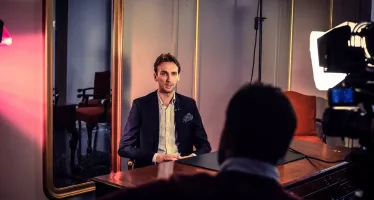When Wheels Fall Off a Gender-Balance Bid by a Wall St Hedge Fund, It Turns to Woman vs Man
Fair Play, screening on streaming service Netflix, shows that entrenched, society-imposed values can be hard for individuals to shake off…
Businesses are paying more attention to diversity in their senior teams, and things are gradually moving into positive territory. The percentage of board seats filled by directors from diverse ethnic backgrounds has risen to 22 percent. When it comes to gender balance, 54 percent of new board seats have been taken by women.

But could there be a price to be paid for this workplace diversity? On paper, and at the bottom line, almost certainly not. In reality… perhaps. Because we’re a weak and fallible species, and our inner demons can flare to life at the least provocation.
And that’s what happens to Luke (Alden Ehrenreich) and Emily (Phoebe Dynevor) in Fair Play, now screening on Netflix. The precious insights brought to diversity come, in this case at least, with caveats. A simple promotion can be laden with toxic barbs for “traditional” power couples, i.e. one where the man has higher earnings and status.
Luke and Emily are just such a power couple, working at a swish New York hedge fund. Or are they? They want for little, they are beautiful, talented, respectful, grounded, modern. Their ability to transcend the situation, whatever progressive views they seem to hold, is soon put to the test.
Spicing up what would otherwise be a banal tale of internal promotion is the fact that these charming colleagues are secret lovers. Relationships with co-workers are an HR no-no — so no one knows, right? Luke seems set for promotion, and things are going from great to simply wonderful. But then — body shot, plot change — Emily leapfrogs her lover to land a coveted project manager’s position.
At first, it’s all hunky-dory for the beautiful young go-getters. They’re in love, to the point of audience cringe. With more modest acting skills, less professional cinematography, actors with knitting-catalogue handsomeness, and cheesier music, the early part of Fair Play could have come across as made-for-TV drivel, where murderous babysitters or wicked home invaders swoop in to hijack the plot to some grim and unlikely finale.
Not here, though; writer-director Chloe Domont’s light, human touch gives the leads room to showcase their talents. That lovey-dovey saccharine vibe isn’t irritating, partly because we know it’s a springboard. It’s easy to engage in a bit of soapy swooning when we know chaos is coming. Schadenfreude is a powerful thing.
The crash-and-burn of Luke and Emily’s relationship —we silently will them to overcome the challenges, but somehow know they won’t — may not tally with expectations for modern HR policies. Effectively implemented diversity initiatives can enhance a business’s operations, and its bottom line.
But along with the advantages come challenges; if not for the enterprise, then for the individuals concerned. Because we’re all fallible, we all suffer from a lack of self-confidence, we — in spite of ourselves — seek to maintain ingrained traditions and perceptions: men should earn more than their partners, for example. And they do; stats reported in The Guardian show that women earn 84 cents in the male-dominated workplace dollar. That is changing — hooray! — but, um, are we men ready to accept that perceived shifting of status that comes with that?
Luke isn’t, though he gives it his best shot. He smiles warmly, says he’s happy for her, says he’s proud. Kudos to Ehrenreich’s acting chops, here, because the transition from loving partner to neurotic, jealous, increasingly (literally and metaphorically) impotence is an almost unscripted process, conveyed by facial expressions and faltering denials.
Emily is suitably contrite, sympathetic, supportive; but she, too, finds her inner self eroded and altered by her elevation to the C-suite. She has the eye, and the ear, of the hedge fund’s inscrutable CEO, Campbell (Eddie Marsan). Previously, she had just been a woman keeping the corporate diversity ratio sweet; then, one day to the next, she’s living in rarified air.
Luke must watch through glass office partitions as his secret lover is cossetted, fluffed, flirted with, and groomed for the corporate eyrie. His life as a grunt, a simple analyst, grinds on, while she is feted, wined, dined, taken out for nights “with the boys” (only to return, drunk, in the early hours). Switch the gender roles, and — surprise — nothing to see here. That’s just the way it is.
It’s not all roses for Emily at the professional level — she is called a stupid bitch by Campbell when one of her financial hunches nosedives — but the real hell awaits her at home.
By Hal Williams
You may have an interest in also reading…
Autism in Business: Help, or Hindrance?
What do you think the qualities of a successful business leader might be? If you were to ask this question
VR Headsets, Cyborgs and Legal Wrangles: Welcome to the Virtual Music World
AI takes a starring role in entertainment, from deceased stars performing from beyond the grave to digitally created rappers. What
SegurCaixa Adeslas Emphasises Value Creation as a Way to Endure Its Sustainable Growth Strategy
The Spanish insurance company stands out for the digitalization of its proceses that allows it to offer more accesible, personalised


















































































